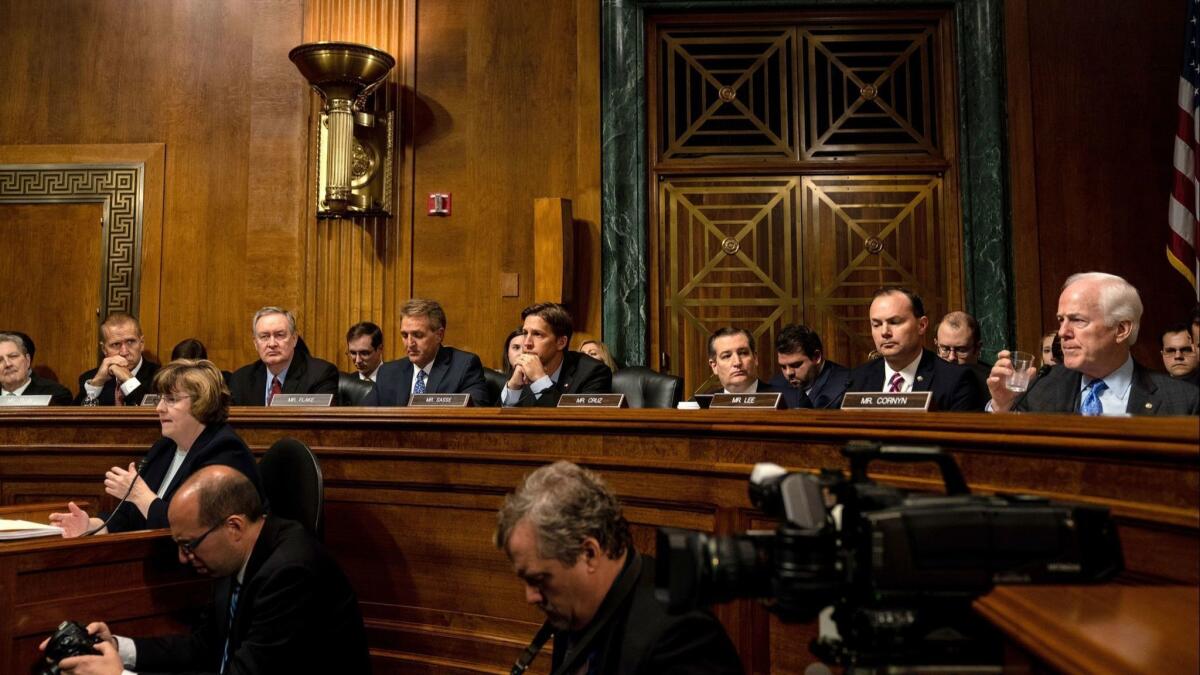Newsletter: The GOP has a gender problem. It needs to fix it

Good morning. I’m Paul Thornton, and it is Saturday, Sept. 29, 2018. Read all the way to the end of this newsletter if you want to see me eat my words. Let’s take a look back at the week in Opinion.
Most people don’t have the benefit of working nine-hour Senate hearings into their office schedules, so I offer my respect to those of you who listened to or watched Thursday’s gut-wrenching Judiciary Committee grilling of Christine Blasey Ford and Brett Kavanaugh, and my condolences for having to catch up on a day’s worth of work. For me, listening to the shoutfest billed as a hearing was work, so I’ve got that going for me.
Right now, how the statements by Kavanaugh and his sexual assault accuser Ford will alter the confirmation process is being worked out. But the spectacle itself — of all Republican men, many of them elderly, falling over themselves to apologize to Kavanaugh but so spooked by Ford that they had to hire a lady lawyer to talk to her — will remain as indelible in our civic conscience as Ford said the trauma inflicted on her as a 15-year-old remains in her mind.
That the hearing would play out this way was predictable, given the stark gender split on the Senate Judiciary Committee. The Democratic side comprises men, women and people of color; the Republican side, all white men. In an L.A. Times op-ed article, political scientists Jennifer M. Piscopo, Diana Z. O’Brien and Amanda Clayton explain how the Republicans’ lack of gender diversity colors the public’s perception:
Some Republicans are worried that any attack on Ford’s character will be viewed as an attack on all women. Surely this is one reason Republicans on the committee have hired a female attorney to question both Ford and Kavanaugh.
Their fears are well-founded. According to our research, the committee’s gender disparity will send a powerful signal. The signal will not only concern whether Republicans respect women, but whether the committee can be trusted at all.
In an experiment conducted in 2016, we asked a nationally representative group of 1,000 Americans to read a fictitious news story about a state legislative committee determining sexual harassment penalties.
The stories that our respondents read were nearly identical, but with key variations. One version said the committee was composed only of men. Another said the committee was half men, half women. At the end, we asked respondents to evaluate the committee and its decision.
Respondents who were told the committee was all men were more likely to say that the outcome should be overturned. They were also more likely to say that the committee’s process was unfair, and that the committee could not be trusted to make the right decision.
The all-male committee was judged more harshly across the board: by men, women, Republicans and Democrats. Because political scientists link fairness and trust to legitimacy, we concluded that an absence of women made the process appear illegitimate ....
The representation of women is more than a matter of principle. When it comes to who is in office and what they decide, citizens want more women, and they especially want women when women’s rights are at stake.
Talk of the Ford-Kavanaugh hearing has already generated a new wave of outrage over sexual harassment and sexual assault. For many Americans, the Senate Judiciary Committee’s gender disparity will mean any confirmation of Kavanaugh cannot be trusted.
It's all about power — not fairness, justice, due process or the rule of law, but raw, Republican power. Kavanaugh screamed at Democrats and used nakedly partisan language (belying any hope that he can judge without prejudice), and the Republicans on the Senate Judiciary Committee pushed along his confirmation based on a party-line vote. L.A. Times
Don’t confirm Kavanaugh without an FBI investigation. The Times Editorial Board says both witnesses at Thursday’s hearing were credible, but because their testimonies were irreconcilable, neutral nonpolitical investigators need to get at the bottom of what happened. L.A. Times
More on the Kavanaugh nomination: Jon Healey, the deputy editorial page editor, says Sen. Jeff Flake pulled a John McCain by asking for an FBI investigation before a final vote on the nominee. Immediately after the hearing, Healey wrote that while Ford appeared visibly shaken but implacable, Kavanaugh was just shaken. Gabrielle Selz answers Republicans who say Ford should have come forward earlier: Women doesn’t report sexual assault because no one hears them, she says. Columnist Jonah Goldberg says the problem is with people who prioritize believing sexual assault accusers over collecting evidence.
Adiós, Kevin De León. Columnist Gustavo Arellano says he plans on voting for him, but Kevin De León’s attempt to unseat Sen. Dianne Feinstein may one day be a textbook lesson of what happens in California when young politicians don’t wait their turn. It would have been better for him to run for lieutenant governor, a la Gavin Newsom, and languish in political purgatory for a few years until higher office beckoned. L.A. Times
Letting school kids sleep in is a good idea, but Gov. Jerry Brown vetoed it. Educator Henry Nicholls applauds a failed effort in California to legally mandate later school start times and says Brown’s veto was “deeply regrettable” and showed a “tragic disregard for both the mental health of children and for science.” New York Times
For the record, The Times Editorial Board agreed with Brown’s veto.
This is where I eat my words. Last week, I started the newsletter by suggesting the Dodgers were on a sure path to another National League West Division championship. Oops.
Reach me: paul.thornton@latimes.com
